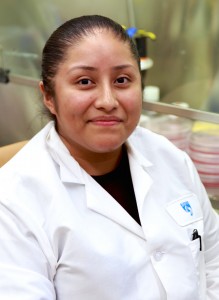CSUN Biotech Senior Attends Harvard Stem Cell Institute Internship for Summer
Spending a summer away from home is often a highlight of college life, but rarely does it involve participating in seminars and lab research at an Ivy League university across the country. For Caroline Arellano-Garcia, a senior biotechnology major at California State University, Northridge, such an experience only enhanced her college years.
Arellano-Garcia is one of only 40 undergraduate students nationwide taking part in the 2014 Harvard Stem Cell Institute (HSCI) Internship Program, which provides participants with a challenging summer research experience in a cutting-edge stem cell science laboratory. Since early June, she has conducted research in the Brigham and Women’s Hospital in Boston in the laboratory of HSCI-affiliated faculty member Sandra McAllister.
Arellano-Garcia’s summer project explored how some types of breast cancer tumor cells can inhibit the growth of other tumor cells that have entered the bloodstream. The research could help identify new targets for cancer therapies.
“This internship has had its challenging moments, but they have taught me how to become a better problem solver in the laboratory setting as well as helped me further develop a resilient personal character,” Arellano-Garcia said. “When an experiment in the lab doesn’t work, instead of accepting defeat, my interest and desire to learn help drive me toward continuing my project and repeating any necessary experiments. These memorable lessons have helped solidify my interest in pursuing a Ph.D. within the sciences.”
Over the course of the summer program, interns participate in a stem cell seminar series, a career pathways presentation and a weekly stem cell companion course. They present their summer research findings — both orally and in poster format — at an end-of-program symposium.
“Undergraduate stem cell research programs give [students] hands-on experience in labs and sets them up to go into graduate programs and careers with practical knowledge,” said Larry Allen, department chair of biology. “As professors, we have to use research as a teaching instrument. That’s the only teaching we do around here — it’s in labs and field work, and it prepares students for their future endeavors. Grad schools love our students [because] they don’t have to be taught to do the pragmatic work.”
The Harvard Stem Cell Institute is a collaborative of more than 1,000 leading scientists, postdoctoral fellows, graduate students and undergraduate students who are associated with one or more of the university’s schools and affiliated hospitals and are working to advance the understanding and use of stem cells in basic research and regenerative medicine.
CSUN’s College of Science and Mathematics is among the top colleges in the nation preparing students who go on to earn doctoral degrees in the sciences. In addition to ensuring that the region and the nation has a pool of talented scientists capable of assuming leadership roles in a knowledge-based, multicultural society, the college also prepares students to attend medical, dental and pharmacy schools. Students also have an opportunity to co-author publications with faculty members and present their research results at national and international meetings.
California State University, Northridge has more than 38,000 full- and part-time students and offers 63 bachelor’s and 53 master’s degrees, as well as 28 teaching credential programs. Founded in 1958, CSUN is among the largest single-campus universities in the nation and the only four-year public university in the San Fernando Valley. The university is home to dozens of nationally recognized programs where students gain valuable hands-on experience working alongside faculty and industry professionals, whether in the sciences, health care and engineering or education, political science, the arts and the social sciences. While regionally focused, the university’s faculty and administrators recognize the important role its students and alumni play in shaping the future of the state and the nation.


 experience
experience